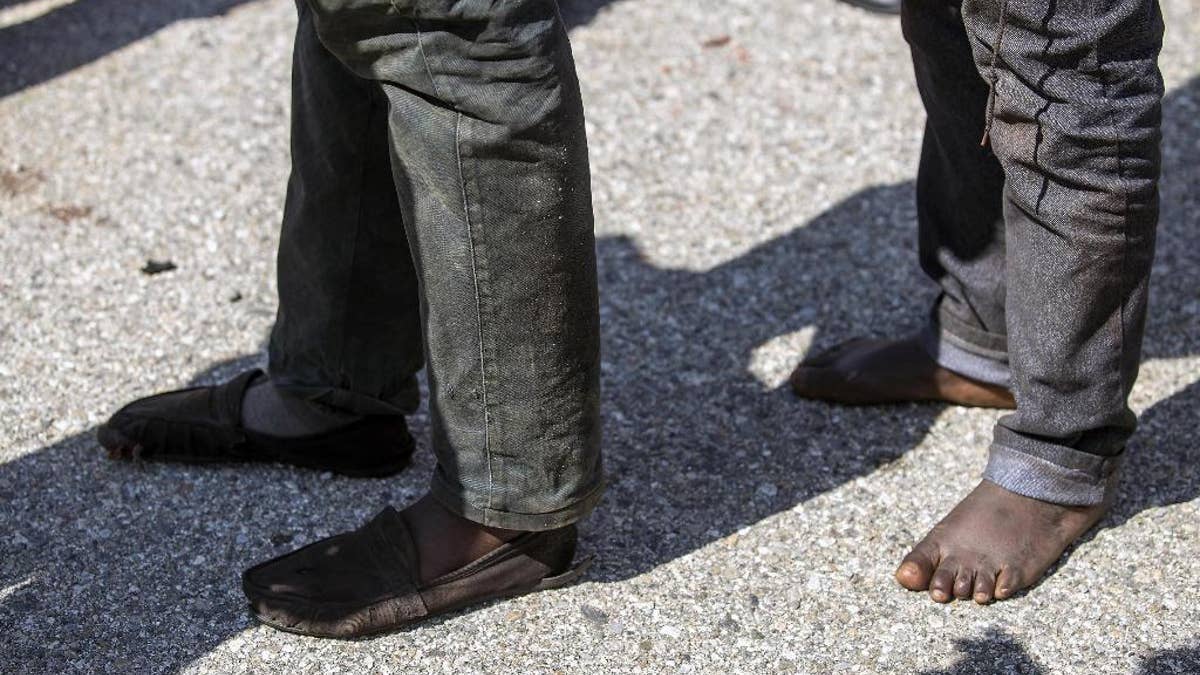
Rescued migrants line up after disembarking at the southern Italian port of Corigliano, Italy, Wednesday, April 15, 2015. Survivors of a capsized migrant boat off Libya have told Tuesday, April 14, the aid group Save the Children that an estimated 400 people are believed to have drowned. Even before the survivors were interviewed, Italy's Coast Guard said it assumed that there were many dead given the size of the ship and that nine bodies had been found. (Francesco Arena, ANSA via AP) (The Associated Press)
BRUSSELS – More than 400 migrants were reported missing and nearly 10,000 more have been rescued in the Mediterranean over the last four days, highlighting the scope of the challenge facing the European Union and further exposing weaknesses in its migration policy. Here are some questions and answers about the situation:
___
Q: WHY ARE PEOPLE RISKING THEIR LIVES TO REACH EUROPE?
A: Some are fleeing conflict or persecution and others are looking for a way out of poverty. They come from countries including Eritrea, Niger, Syria, Iraq and Somalia. Many claim to be Syrian to improve their chances of staying. Right now, the weather is good, so smugglers are bringing over more people willing to spend thousands of euros apiece to risk their lives on poorly-maintained, overcrowded boats.
Q: HOW BIG IS THE PROBLEM?
A: Almost 280,000 people, some refugees escaping conflict, entered the EU illegally last year, a 138 percent increase over 2013. The International Organization for Migration estimates that at least 3,279 died in the Mediterranean in 2014. The U.N. refugee agency predicts that some 500,000 more people will flee Syria alone in 2015.
Q: HOW DO THEY GET TO EUROPE?
A: The main route is through conflict-torn Libya, where there are no effective border controls and smugglers are operating with near impunity. They have developed a well-oiled operation of acquiring boats and sending the migrants off with a satellite phone to make a call to Italian or Maltese authorities to come to their rescue once they're at sea.
Q: WHO IS HELPING SAVE MIGRANTS IN THE MEDITERRANEAN?
A: Under international law, the nearest vessel to any emergency must try to come to the rescue. These are often civilian ships — including ferries, cargo or private vessels — or national coast guards. The EU's border agency Frontex has ships and planes in the Mediterranean but its job is to monitor Europe's borders and migration flows, not save lives.
Q: WHAT WAS MARE NOSTRUM AND WHAT HAPPENED TO IT?
A: Mare Nostrum was an emergency search and rescue effort that Italy launched after more than 360 people drowned off the southern island of Lampedusa in October 2013. The operation was politically unpopular in Italy, which has long argued that the European Union as a whole should shoulder the burden of migration. The massive operation saved more than 100,000 lives, in part because it operated so closely to Libya's coast. But at 9.5 million euros per month, it was considered too expensive to continue in the long term and it officially ended Oct. 31.
Q: WHAT IS OPERATION TRITON?
A: Operation Triton was launched by Frontex in November to replace Mare Nostrum, though Italian vessels continued to make up the bulk of ongoing sea rescues. Triton is not a search and rescue mission, but rather a border management mission. It has three aircraft and six ships, supplied by EU member states, and a budget of 2.9 million euros per month. The 28 EU members agree that Frontex should have a bigger budget and more equipment but no nation has come forward with new offers.
Q: WHAT HAPPENS TO THOSE WHO MAKE IT TO EUROPE ALIVE?
A: Migrants picked up at sea are supposed to be interviewed and have biometric and other data recorded as soon as they arrive. They are taken to reception centers where they can apply for asylum or some other form of legal status. Asylum can only be granted in the European country where they first land, but many refugees never register themselves in Italy, instead preferring to head immediately for train stations to travel to northern European destinations where they can apply for asylum. Some are given temporary permits allowing them to stay while their applications are processed. Some are invited to return to their countries of origin voluntarily, while others are returned forcibly.
Q: WHAT IS EUROPE DOING ABOUT IT?
A: The EU's executive commission will unveil its new strategic migration agenda in late May. It wants to beef up border controls, improve burden sharing, deepen contacts with countries that migrants leave or pass through on their way to Europe and find more legal ways for people to come. The EU also wants to set up immigration screening centers in Libya's neighbors; Niger, Tunisia and Egypt.
